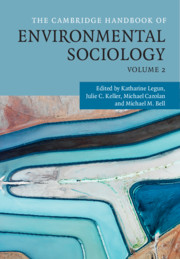Book contents
- The Cambridge Handbook of Environmental Sociology Volume 2
- The Cambridge Handbook of Environmental Sociology
- Copyright page
- Contents
- Figures
- Tables
- Contributors
- Foreword
- Introduction
- Part I Methods
- Part II Embodied Environmental Sociology
- Part III Beyond the Human
- Part IV Sustainability and Climate Change
- 12 Possibilities and Politics in Imagining Degrowth
- 13 Sustainable Consumption
- 14 Sustainability Cultures: Exploring the Relationships Between Cultural Attributes and Sustainability Outcomes
- 15 Socio-Ecological Sustainability and New Forms of Governance: Community Forestry and Citizen Involvement with Trees, Woods, and Forests
- 16 Carbon Markets and International Environmental Governance
- 17 The Multi-Level Governance Challenge of Climate Change in Brazil
- Part V Resources
- Part VI Food and Agriculture
- Part VII Social Movements
- Index
- References
12 - Possibilities and Politics in Imagining Degrowth
from Part IV - Sustainability and Climate Change
Published online by Cambridge University Press: 05 November 2020
- The Cambridge Handbook of Environmental Sociology Volume 2
- The Cambridge Handbook of Environmental Sociology
- Copyright page
- Contents
- Figures
- Tables
- Contributors
- Foreword
- Introduction
- Part I Methods
- Part II Embodied Environmental Sociology
- Part III Beyond the Human
- Part IV Sustainability and Climate Change
- 12 Possibilities and Politics in Imagining Degrowth
- 13 Sustainable Consumption
- 14 Sustainability Cultures: Exploring the Relationships Between Cultural Attributes and Sustainability Outcomes
- 15 Socio-Ecological Sustainability and New Forms of Governance: Community Forestry and Citizen Involvement with Trees, Woods, and Forests
- 16 Carbon Markets and International Environmental Governance
- 17 The Multi-Level Governance Challenge of Climate Change in Brazil
- Part V Resources
- Part VI Food and Agriculture
- Part VII Social Movements
- Index
- References
Summary
The chapter argues that degrowth offers a promising alternative to the more mainstream sustainable development approach embraced by most national governments and international institutions. It first traces the development of the degrowth movement in both activist and academic networks; and moves on to outline its core ideas, namely the critique of growth, the emphasis on social justice and democracy, and the repoliticisation of the economy. The practical measures and institutional arrangements that could facilitate a transition towards degrowth are then explored. Finally, it is suggested that the reorganisation of society away from growth calls for a radical re-articulation of values and a re-imagination of economic relations, for example in terms of abundance, sharing, caring, amateur work. Thus the economy needs to be re-embedded in the social and political rather than seen as autonomous.
- Type
- Chapter
- Information
- The Cambridge Handbook of Environmental Sociology , pp. 205 - 220Publisher: Cambridge University PressPrint publication year: 2020
References
- 2
- Cited by

